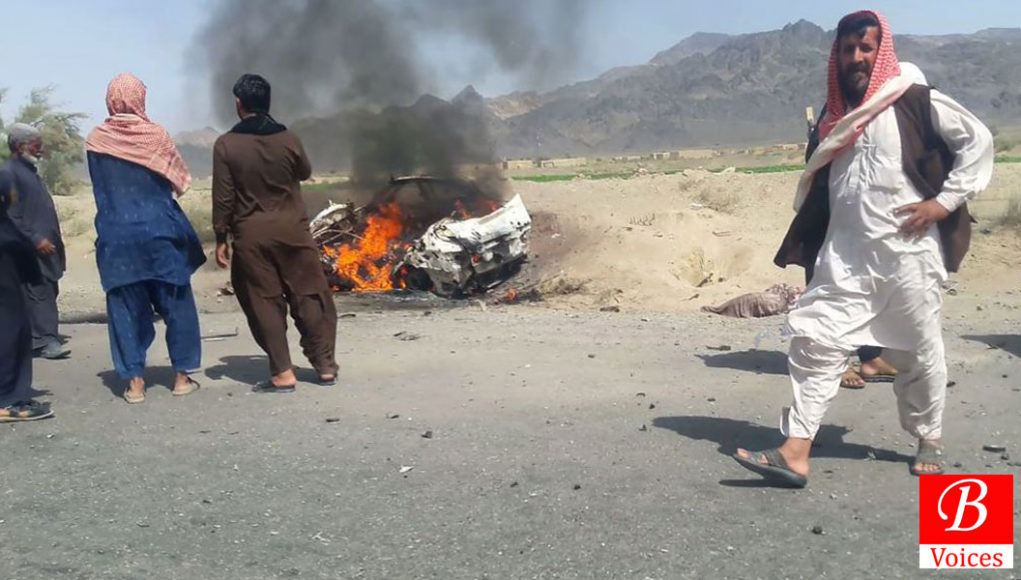Naila Tasneem
A raid by United States Navy Seal commandos killed Osama Bin Laden on 2 May 2011, while he was residing in a compound in Abbottabad. This proved to be a great victory for the Democratic Party as President Obama got reelected in 2012 Presidential elections. On May 21st 2016 another drone strike took place in Balochistan. Both the Afghan government and members of the insurgent movement declared that Mullah Mansoor had been killed by this attack in the province of Balochistan in an operation involving multiple drones. It shouldn’t be a surprise that ahead of the upcoming US Presidential elections in November 2016 a drone strike in Pakistan targeting a major Taliban leader could help Democratic Party bag its third consecutive victory.
May 2011 and 2016 both hold a lot of significance with respect to US presidential elections and its drone strikes policy for Pakistan. Special Assistant to the Prime Minister on Foreign Affairs Syed Tariq Fatemi summoned the US envoy to protest that the drone strike was a violation of Pakistan’s sovereignty. Furthermore, it is a breach of the United Nation’s Charter that guarantees the inviolability of the territorial integrity of the member states.
He also conveyed that such actions could sabotage the ongoing efforts by the Quadrilateral Coordination Group for facilitating peace talks between the Afghan government and the Taliban. Drone strikes in Pakistan have now become an adventure for the US like a perfect Hollywood movie plot and we at most consider them an “embarrassment” that violates our sovereignty. Since 2011 we have never tried to resolve this issue upfront and the Abbottabad Commission report has yet to be made public. A major newspaper reported that the commission had given recommendations to the government that were aimed at averting another May 2 like operation. The Parliament should have taken up this matter with the government and agencies operating in the country so policies could be outlined to prevent future foreign adventure operations. If Pakistani soil is being used to harm national interest of any world power it should be the Pakistani authorities that should be the first one to learn about it and be taking subsequent action. Failure to deny safe havens to Taliban and banned extremist outfits has lead to another May with mayhem.
Why it is hard to take this debate forward and deal with the issue of “safeguarding sovereignty” holistically? Firstly, we are too messed up internally. We don’t have a foreign minister, neither a clear foreign policy. The historical national security perspective on foreign policy matters limits the ability of political governments on many foreign policy fronts. Hence there is lack of civil military consensual, unified and a coherent approach on matters related to relations with neighboring countries, drone strikes etc. Although Pakistan has launched a comprehensive military operation to deal with the menace of terrorism we still have to work towards controlling extremism and radicalization that helps in providing support to militants domestically. Firstly, we need to have a consensus regarding dealing with the remnants of Afghan war some of whom are now either supporting Afghan Taliban or are trying to show allegiance to ISIS. We need to have a clear national policy on sectarianism, extremism before we can fully eliminate terrorism. We cannot afford to harbor nuisances like Abdul Aziz in the heart of Islamabad in a major mosque. Such people cannot be role model for the society who lead an incursion against the state, inflame schism among religious groups and propose support for ISIS.
We need to eradicate internal violation of sovereignty by extremist mindsets in all institutions. We as citizens of Pakistan must be wary of why people like Osama Bin Laden and now the latest Mullah Mansoor are found on Pakistani soil. How do we allow such elements to live, travel, operate through Pakistani soil? This internal violation of sovereignty is directly linked to the external violation by US drone strikes. We will have to deal with both dimensions of this issue in order to safeguard our national integrity. The parliament must chalk out a strategy to deal with issues that adversely affect our territorial integrity. We need to work on educational reforms that help in dealing with religious discrimination, ethnic fractionalization and marred diversity. Dealing with radicalization is a complex matter and will require much more than military prowess. We need education to curb hate speech, intolerance and inculcate pluralistic values.
Since the attack took place in Balochistan we need to pay some special and much needed attention to the dynamics of border control in Balochistan. We need to understand that the security situation in Balochistan will have to be revisited. The province is already marred by insurgencies, sectarian violence and terrorism. We also have issues on the governance front. Hence we need economic, political and social integration of Balochistan with the entire country. The more we alienate it from the mainstream by limiting the discourse on human rights, economic deprivation and poor health and education indicators the more we push it into the abyss of anti-state activities and foreign incursion. In order for Balochistan to rise up to the multifaceted challenges we need to empower the local people. Post CPEC it is imperative for us to revisit security dynamics of Balochistan. Drone strikes are certainly not conducive to the CPEC, people of Baluchistan and the state of Pakistan.
We must build a strong counter narrative to deal with extremist mindset in all spheres of our society so that there are no safe havens or sanctuaries that can operate and violate our territorial integrity and propitiate radicalization. It is our job to safeguard our territorial integrity and sovereignty from covert incursions and not of the US. Hence we will have to take tough decisions and prioritize securing our boundaries and borders from illicit movements and exchanges. We must also build solid partnership with our neighbors Afghanistan and Iran and enhance cooperation to deal with terrorism, sectarian violence and effective border management.
Writer is an Economist based in Lahore.
Email: [email protected] Twitter @npanthers
Disclaimer: Views expressed in this article are those of the author and Balochistan Voices not necessarily agrees with them.
Share your comments!








